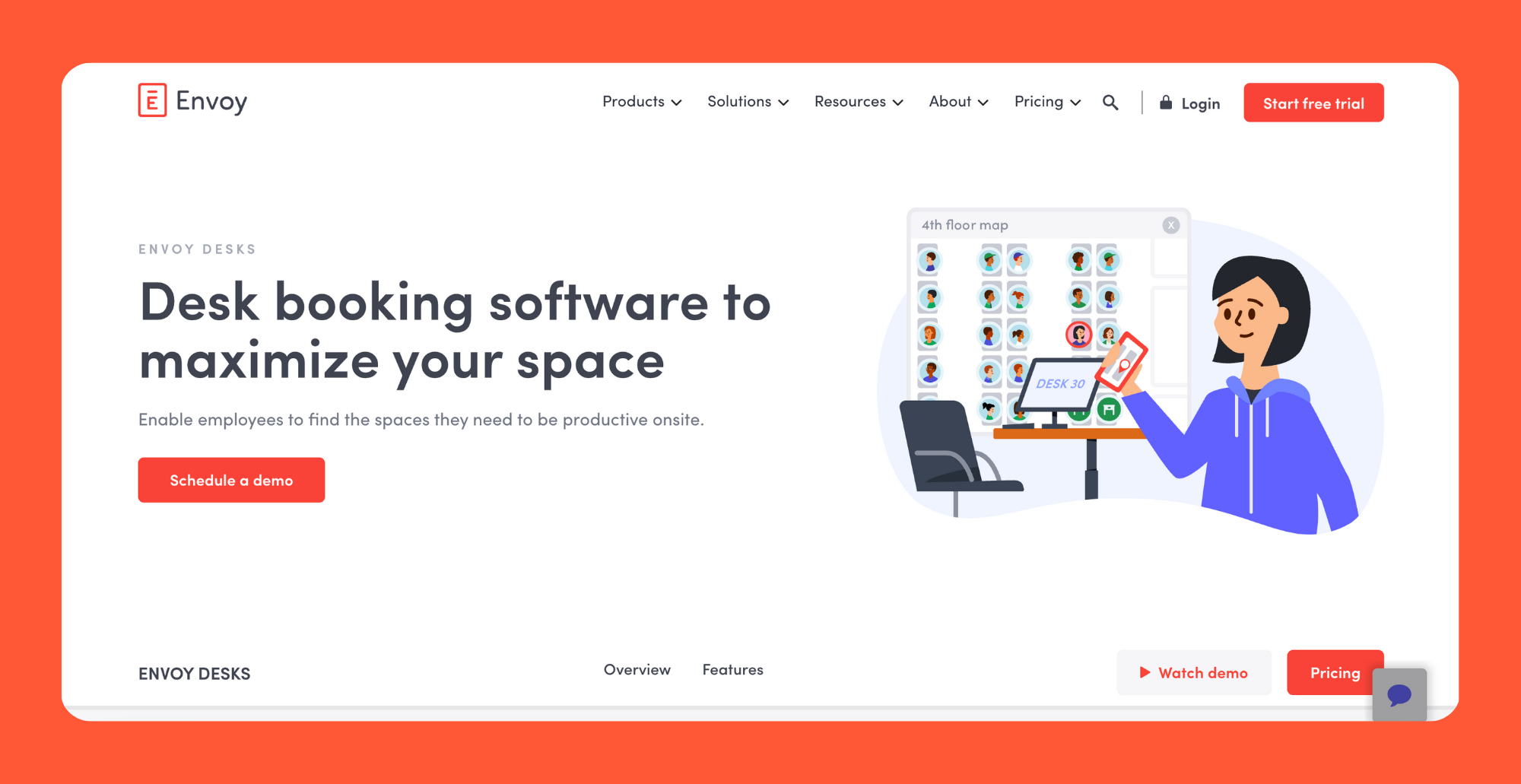In the ever-evolving world of hybrid work, we know how important it is to find the right workplace management software. Robin Powered has long been a popular choice, but depending on your needs, other platforms might be a better fit. Whether you're managing desks, coordinating meeting room bookings, or optimizing office layouts, there are now several tailored, high-performing options and competitors worth exploring.
Let’s explore what Robin offers, why some users are looking elsewhere, and which platforms stand out this year.
Understanding Robin Powered and Its Core Offerings

Robin Powered is a well-known workplace management platform built to help businesses transition to hybrid office models. It combines desk booking, room scheduling, and visitor management in a clean, tech-forward interface.
Its key features include:
- Desk booking and hot desking
- Room scheduling for meeting rooms and shared spaces
- Visitor management with check-in functionality and QR codes
- Real-time availability of desks and rooms
- Integrations with Microsoft Teams and Outlook
- Interactive maps to navigate office spaces and locate coworkers
Robin is widely adopted by mid-sized and enterprise-level businesses, especially those with dynamic office layouts and distributed teams.
Its user-friendly interface makes navigation easy once you get the hang of it. The interactive floor plans and check-in features are particularly helpful for managing hybrid workforces.
Still, users sometimes run into hurdles:
- Pricing can be steep for growing teams or smaller businesses
- Limited customizable features when it comes to booking rules or UI tweaks
- Less flexibility for offices with evolving hybrid policies
- A learning curve for some employees, especially in larger organizations
Why Look For Robin Powered Alternatives?

If you've tried Robin and felt it wasn’t quite right, you're not alone. Businesses today have diverse, changing needs, and that’s where “fit-for-purpose” tools shine.
Here are some common reasons companies explore other options:
- They need customizable features tailored to specific workflows
- They want better customer support and onboarding experiences
- They’re looking for lower-cost platforms with similar features
- They rely on actionable insights and data-driven decisions
- They value flexibility in managing spaces and hybrid office policies
Every business is unique. What works for a 100-person team might feel clunky in a 1,000-person enterprise. That’s why it’s essential to consider tools that integrate seamlessly with existing workflows, support scalable resource allocation, and offer the kind of real-time updates and analytics needed to make informed decisions.
Top Robin Powered Alternatives in 2025
elia: Best for Custom Workflows & Seamless Hybrid Workspace Management

elia is designed with flexible workplaces in mind. It offers a sleek, user-friendly interface that lets teams book desks, reserve meeting rooms, and manage visitors with ease. What sets elia apart is its customization and automation capabilities, allowing admins to adapt the tool to their unique office culture. It features interactive floor plans, real-time availability, and seamless integration with Microsoft 365 tools, making it ideal for fast-growing or dynamic teams.
Archie: Best for AI-Driven Workplace Optimization

Archie leverages AI to analyze your workspace usage and offer optimization suggestions that help reduce underutilized space. It includes all the core features: desk booking, room scheduling, and visitor management, along with predictive analytics that help you avoid double bookings and unnecessary overhead. It’s a smart choice for companies looking to make data-backed decisions while maintaining a flexible and efficient workplace.
Condeco: Best for Enterprise-Level Resource Management

Condeco is built for large enterprises that need powerful resource management tools and robust scheduling for global teams. Its strength lies in deep integration with enterprise systems like Microsoft Outlook, Exchange, and Teams, making room booking and calendar syncing seamless. While the platform has a steeper learning curve, it provides enterprise-grade controls, workflows, and compliance features, making it a go-to for industries with high security or regulatory requirements.
Skedda: Best for Simple, Self-Service Desk Booking

Skedda is perfect for small businesses and coworking spaces that want a no-fuss way to reserve desks or rooms. Its clean interface and self-service setup let users quickly book spaces without administrator involvement. Though it lacks some of the more advanced features found in larger platforms (like visitor flows or analytics), its affordability and ease of use make it a practical choice for straightforward desk management needs.
Kadence: Best for Data-Driven Decisions and Team Coordination

Kadence is built around helping hybrid teams coordinate their in-office presence. It offers detailed space usage analytics, enabling data-driven decisions about who should be in the office and when. It supports both hot desking and assigned seating, and its smart scheduling tools help avoid overcrowding or empty office days. For teams navigating the complexities of hybrid office planning, Kadence brings structure and insights to the table.
Envoy: Best for Visitor Management and Workplace Security

Envoy is widely recognized for its robust visitor management features. It includes features like touchless check-in, QR codes, badge printing, and compliance tracking, which are ideal for security-conscious workplaces. While it doesn’t focus heavily on desk booking, it’s a strong complement to other platforms or a standalone option for front desk and security teams. Integration with access control systems and real-time tracking makes it particularly valuable in high-traffic or secure office environments.
OfficeSpace: Best for Scalable Resource Allocation

OfficeSpace offers a wide range of tools to manage desks, rooms, and resources across multiple office locations. It includes interactive floor plans, hot desking support, and detailed analytics to help businesses allocate space effectively. It’s particularly well-suited for mid-size and enterprise companies with a dispersed workforce, thanks to its scalability and robust customization options. The platform is versatile and can evolve with your workplace needs over time.
Officely: Best for Slack-Based Hybrid Workflows

Officely lives directly inside Slack, making it perfect for teams already using Slack as their daily HQ. You can book desks, indicate in-office days, and view who’s coming in—all without leaving Slack. While it’s not as feature-rich as some enterprise platforms, its simplicity, speed, and focus on hybrid workspace coordination make it a winner for smaller teams or startups looking for seamless integration without extra logins.
Tactic: Best for Real-Time Space Planning

Tactic gives admins and employees a live view of real-time availability across desks, rooms, and office zones. Its interactive maps and visual tools make it easy to see who’s sitting where and avoid double bookings. It’s especially useful for flexible workplaces that need on-the-fly planning, and its data layer offers helpful insights into how spaces are actually used day-to-day. Tactic is all about agility and clarity.
AskCody: Best for Advanced Room Booking Integrations

AskCody provides specialized solutions for room scheduling and services like catering, AV, and cleaning, all managed through one dashboard. It offers strong integration with Outlook and Exchange, allowing for complex workflows tailored to corporate needs. This platform is ideal for organizations with high meeting volumes or support service coordination, such as law firms or universities. It’s powerful but best suited for structured environments.
Yarooms: Best for Budget-Conscious Hybrid Teams

Yarooms delivers essential hybrid workspace management tools such as desk booking, room scheduling, and some analytics, at a lower cost than most competitors. It’s a smart entry-level option for small teams or organizations just beginning their hybrid journey. While it may not offer the deepest customization or integrations, it covers the basics reliably and affordably, making it one of the best alternatives for startups or budget-sensitive businesses.
Comparative Analysis: Robin Powered vs. Alternatives
Ready to Upgrade Your Workplace Experience?

If you're feeling boxed in by Robin or any platform that isn’t delivering exactly what your workplace needs, it may be time to explore new options.
elia, in particular, stands out for businesses who want flexibility, ease of use, and valuable insights into their office usage without compromise.
Here’s why we recommend giving elia a try:
- Customizable booking rules tailored to your workflows
- Interactive maps and clear visibility into space availability
- Excellent customer support from onboarding to scaling
- Seamless integrations with Teams, Outlook, and Google
- A truly user-friendly interface built for hybrid offices
Ready to boost productivity and manage desks smarter? Schedule a demo with elia today to see how we can transform your hybrid workspace together.

.png)
.png)

![Hot Desking vs Activity-Based Working: The Comparison Guide [2026]](https://cdn.prod.website-files.com/64f88f68249f7cafe071d150/6983b914d7fa26ca621795b6_160.png)
.png)